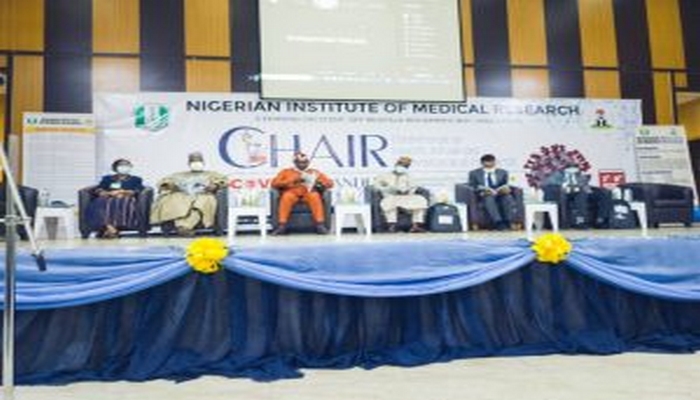
The Secretary to the Government of the Federation, Mr Boss Mustapha, has commended the Nigerian Institute of Medical Research (NIMR) for launching the country into a new phase of scientific research through its programmes.
Mustapha gave the commendation on Tuesday, at the ongoing Conference on Health Advances, Innovation and Research (CHAIR), organised by the NIMR in Lagos.
The News Agency of Nigeria (NAN) reports that the theme for the three-day event is: ”COVID-19 Pandemic: consolidating the gains and addressing the shortfalls”.
Mustapha, represented by Dr Muktar Mohammed, the National Coordinator of the Presidential Steering Committee on COVID-19, described the conference as ingenious and timely.
He said:” This prestigious conference on health provides a viable platform for robust intellectual engagement and cross exchange of ideas and issues that affect the health sector of our nation.
“In view of the enormous public health challenges, the morbidity and mortality for COVID-19 at both local and international levels makes it timely and ingenious.
“It is my hope and desire that this conference will not only contribute to galvanise efforts to end the pandemic in Nigeria, but also consolidate on the enormous gains we have made in the fight against COVID-19.
” I believe it will also serve as a platform to launch Nigeria into a new phase of deep scientific research, innovation and medical revolution”, he said.
Also speaking, Dr Faisal Shuaib, the Executive Director of the National Primary Health Care Development Agency (NPHCDA), stated that vaccine nationalism posed a great threat to vaccination.
Shuaib, the guest speaker at the conference and represented by Dr Abdullahi Garba, Director of Planning, Research and Statistics at NPHCDA, said via zoom that 8.2 million vaccine shots had been administered so far.
“Vaccine nationalism remains a great challenge to vaccination as this is not allowing other low-income countries to secure supply and have access to vaccines.
“In spite of this challenge, however, the country so far has commitment and donations that are the equivalent of 100 million doses of vaccine through COVAX, Africa Union and countries like the U.S, UK and France.
“So far, over 5 million of our population have received the first dose while over 3 million have also received their second shots”, Shuaib said.
The executive director said that some of the vaccines received by the country had short expiration dates.
“We receive vaccines with short expiration date and this puts us in so much pressure, but, despite this, we have not lost any vaccine to expiration,” he said.
Speaking earlier, a Professor of Clinical Microbiology at the University of Cambridge in the UK, Ravindra Gupta said that the COVID-19 Pandemic had brought the world together.
Gupta, who is the Chairman of the conference, noted that the pandemic had shifted attention from other diseases that also needed urgent attention.
“The COVID-19 pandemic has fostered international collaboration and research, even though it has shifted focus away from diseases like tuberculosis, malaria, non-communicable diseases and others.
” I think it is high time to also channel this same focus to eradicate some of these diseases that are endemic in some parts of the World,” he said.
Also speaking earlier, Prof. Babatunde Salako, the Director-General of NIMR, said the conference was repackaged to engender national ownership for greater collaboration and impact across the biomedical sector.
Salako said that the Institute had contributed immensely to the control of the pandemic in the country with ground breaking research works by its researchers and testing over 41,000 people for COVID-19 for free.
According to him, the country must not lose sight of other diseases that bear the highest burden such as tuberculosis, HIV and Malaria.
“This is the maiden edition of CHAIR that seeks to direct focus on health advances and innovations from research for national health.
“The figures of cases and deaths of COVID-19 may have increased in folds if not for advances and innovations made in COVID-19 prevention technologies, developed through research and development.
“While these are giant strides in reversing the impact of the pandemic, we must not also lose focus of its direct effects on other health challenges that are peculiar to us as a country,” he said.






